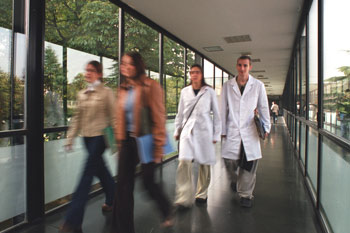How to face the labor market successfully?
The School of Sciences organizes an introductory workshop to the world of work with professionals who will talk about their experience and experts who will offer a guide first steps for recent graduates.

As it happens every year, the School of Sciences of the University of Navarra has organized the workshop introduction to the world of work, aimed at students of Biology, Biochemistry and Chemistry who are in their final years and want to know how to successfully face the labor market.
Promoted by the Careers Office of Sciences, of the Foundation business-University of Navarra, the workshop will take place on Thursday, February 2 at auditorium of Hexagon Building, with the coordination of Cristina Martínez.
The sessions to be given include Internet resources for searching employment, a talk on professional competencies and human values, access to the first employment through the University's job listings , information on scholarships, funding for master's degrees and the presentation of the high school of Biologists.
Likewise, graduates with a long professional degree program will talk about their experience in a roundtable to be held at 1 pm. According to one of the participants, Javier Aguirre -who currently works in management integral waste, in the group ACR- "we are not born learned or with work experience, so we must rely on factors core topic as specialization, perseverance, languages, the active search for opportunities, the training and continuous information and do not stop looking outward, in addition to the use of new technologies".
A training with high employability
Regarding the importance of his training in finding a first employment, this graduate considers that employability in science "is in the middle average-high half of the table, perhaps partly because of our versatility and ability to learn". He also notes that his degree program has served him well "both in the field of quality and in the industrial environment and Health & Safety Office, where knowledge is required to perform measurements, calculations, formulations or for the mere interpretation of results".
Javier Bernácer, also graduate and researcher of Institute for Culture and Society (ICS), advises that in the field of research students should "have a long-term goal , but also enough flexibility to adapt if something doesn't work". "I think we biologists, biochemists and chemists come out well prepared, although perhaps more creativity is needed. On the other hand, it's worth a final push on the programs of study to have a transcript that will ensure we have good grants."
Regarding his professional career, Bernácer explains that after his doctoral thesis he has been linking projects in different centers in other countries, with public and private grants and without ever being unemployed: "The possibility of having this funding will depend on the academic transcript and on being able to move to expand our training and increase the curriculum. In this sense, many of the biologists and biochemists with whom I shared the degree program have found a work related to their training".
Internships: a gateway to the first employment
María Olaso, who works at laboratory de Análisis clínicos Analistas Asociados and at laboratory Dr. Lafita, advises students to never stop learning: "It is essential to enjoy what you do and to have the desire to improve every day. In my work as an analyst, the most useful thing has been the scientific training in all the subjects related to clinical aspects that we study at degree program, especially Physiopathology, Bacteriology, Immunology, Engineering Genetics and Genetics Molecular, Instrumental Techniques, Virology, Parasitology.... In summary, 95% of the subjects".
In his case, he recalls that he started working right after finishing degree program at the same laboratory where he had done his internship the previous two summers. "I know that there are other colleagues who have also found their first employment at the laboratory where they had done their thesis . In any case, I think it is easier to find work in the environmental area than in healthcare," he concludes.
- Program of the workshop Introduction to the World of Work (pdf)
